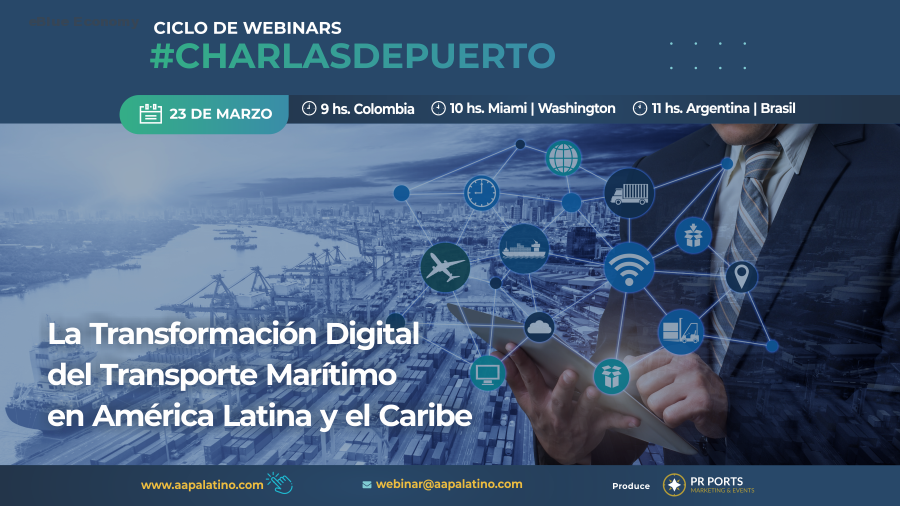Digital transformation was the focus of a new edition of #CHARLASDEPUERTO, the series of webinars organized by AAPA Latino which prepares the agenda of the XXX Latin American Congress of Ports, which will be held in Santos, Brazil, from November 28 to 30.


Rita de Cássia Vandanezi Munck, Chief of Cabinet of Secretaría Nacional de Portos e Transporte Aquaviário de Brasil (SNPTA); René Puche Restrepo, President of Sociedad Portuaria Regional de Barranquilla, Colombia; Santiago Larzábal, Senior Multibrand Manager (Argentina, Uruguay, Paraguay) of A.P. Moller – Maersk; and Agustina Calatayud, Lead Transport Specialist at Inter-American Development Bank.
 Current Status
Current Status
Agustina Calatayud presented the results of a study conducted by IDB specialists on Digital Transformation of Maritime Transport in Latin America and the Caribbean, which was based on information provided by a variety of transport sector partners, including AAPA for the maritime sector, as well as ALTA for air, IRU for land, the World Economic Forum, Intel and Microsoft, among others. In total, there were more than 300 high-level representatives from public and private organizations.
In this context, Calatayud pointed out that “we are in a full process of transformation in the sector, much of which is technological transformation. In Latin America, the interest in digital transformation is relatively new, because in 2016 when we were talking about big data, the internet of things, artificial intelligence, and autonomous vehicles (…) the technologies were known, but adoption was not a priority.”
The results showed that today the scenario is different in our industry: 7 out of 10 respondents indicated that their organization has some digital transformation strategy, beyond simple planning. What’s more, 33% of the interviewed related to the shipping industry say they are in implementing an established plan (versus 31.5% in transportation companies).

The reasons for facing transformation are the automation of processes, the reduction of costs, and the improvement of security. In terms of the technologies used, data analytics/big data and cloud computing stand out, both in a cross-cutting sense for maritime, air, and land transportation.
Finally, the research also showed which are the barriers that slow down digital transformation in Latin America, the three main ones being digital culture factors, implementation costs, and resistance to change.
EXPERIENCES
During #CharlasdePuertos we could also know about the experiences of companies that have incorporated implementation processes in terms of Digital Transformation.

The integrated logistics company Maersk, through its representative Santiago Larzábal, narrated how the company has managed to reduce the time it takes to carry out the supply chain documentation itself, thanks to technology, managing to reduce the process from three weeks to just three days.
This milestone was due to the implementation of a blockchain-based platform called TradeLens, which gathers data from the entire global supply chain ecosystem, including shippers, maritime companies, intermodal terminal operators, regulators, and port authorities.
In this scenario, Larzábal commented that “what we are looking for is to replace the use of paper precisely through TradeLens, in a partnership with International Business Machines Corporation (IBM), we are working in this ecosystem to directly integrate more than 300 organizations, including 10 ocean carriers, not only Maersk but other large international shipping companies.”
“Today we are able to drastically reduce the documentation process from three weeks to just three days. This is key in such a fragmented supply chain with so many decisions,” he added.
In addition, the Maersk executive also emphasized the agreement reached with Unilever, with which they are interrelating in a digital way through TradeLens and Control Tower for end-to-end global operations. He also emphasized the relationship with China Unicom, with which they share real-time data on global trade transactions in mainland China.
On the other hand, René Puche wanted to highlight the role played by the META Project in Barranquilla, Colombia, which involved a complete automation of all operational processes that relate to the port entity’s customers.
“We went from manual processes to a complete digital interaction in a single platform where the entire logistics chain, from customs agencies, shipping lines, authorities, carriers, customers and us the port, spun”, he said.
Later Rita Munck emphasized that in Brazil “we have adopted several tools for digital transformation”, emphasizing one that connects online all the elements related to the arrival of a ship at a port in that country, in order to speed up the process.
Finally, all participants agreed that the treatment of these topics had not been exhausted in this webinar and that these and others related to digitization would be further discussed at the next AAPA Latino to be held in Santos, from November 28 to 30.
















